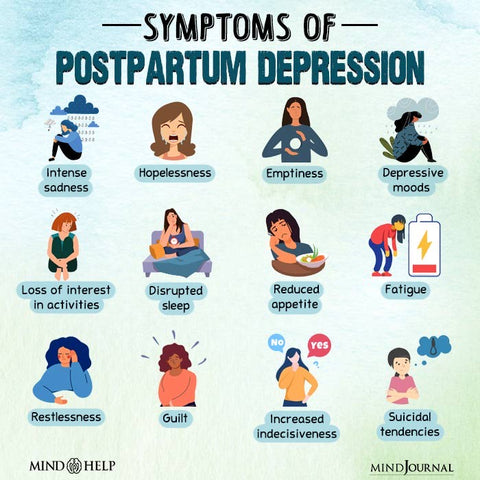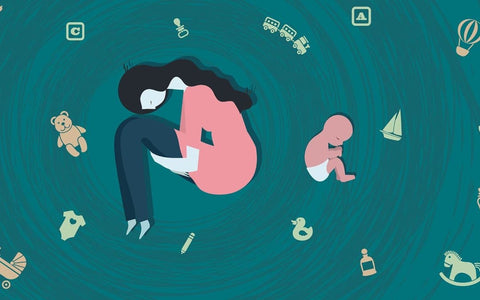Can CBD Help with Postpartum Depression?

Postpartum depression (PPD) is a complex and often silent struggle that affects countless mothers worldwide. It's an emotional challenge that arises after giving birth, marked by feelings of sadness, anxiety, and overwhelming fatigue. PPD is more common than many people realize, impacting roughly 1 in 7 new mothers in the United States alone. However, there is hope and help available for those grappling with this condition.
Recent years have seen a growing interest in alternative treatments for PPD, and one such option that has garnered attention is CBD (cannabidiol). This non-psychoactive compound derived from the cannabis plant has gained recognition for its potential to alleviate various physical and mental health issues. Some mothers have reported that CBD can help ease the symptoms of PPD, offering a glimmer of hope for those seeking relief.
While the experiences of these mothers are encouraging, it's vital to approach this topic with caution and clarity. The journey through PPD is not one-size-fits-all, and what works for one person may not be suitable for another. Moreover, considering the uniqueness of each individual's circumstances, consulting a healthcare professional is not just important; it's crucial.
The importance of professional guidance when it comes to PPD cannot be overstated. Healthcare providers possess the expertise needed to diagnose and assess the severity of the condition. They can also consider various factors, such as medical history, the presence of co-occurring disorders, and the mother's overall well-being, in order to tailor an appropriate treatment plan.
In the case of CBD, it's not a one-stop solution. While some mothers have reported positive outcomes, the scientific evidence supporting its effectiveness in treating PPD is limited. Furthermore, the potential risks and side effects associated with CBD use during pregnancy and breastfeeding require careful consideration. Consulting with a healthcare professional before incorporating CBD into one's treatment plan is crucial to ensure the safety and appropriateness of its use.
Let’s delve deeper into the realm of postpartum depression, exploring its prevalence, symptoms, and challenges. Discuss the traditional treatment options and their limitations, and we will examine how CBD may play a role in alleviating PPD symptoms. Together, let's unravel the complexities of postpartum depression, exploring potential solutions and the importance of seeking professional help for this profoundly sensitive issue.

Understanding Postpartum Depression
Postpartum depression (PPD) is a shadow that can loom over the joyous occasion of bringing a new life into the world. It is a complex and often misunderstood mental health condition that can affect women after giving birth. PPD is distinct from the baby blues, a milder and more common mood disturbance that usually lasts for a few days to a week. PPD, on the other hand, is a more serious and long-lasting condition, requiring careful attention and treatment.
PPD is characterized by a range of emotional and physical symptoms that can make a mother's life challenging. These symptoms can include:
- Persistent Sadness: Overwhelming feelings of sadness and hopelessness are common. Mothers with PPD often find it difficult to experience joy, even in moments they anticipated with happiness.
- Anxiety and Irritability: Anxiety levels may skyrocket, accompanied by irritability. These feelings can manifest as restlessness and difficulty in concentrating.
- Fatigue: PPD can lead to extreme fatigue, making it difficult for mothers to perform everyday tasks or care for their newborns.
- Changes in Appetite and Sleep: Disruptions in eating and sleeping patterns are common. Some may experience overeating and increased sleep, while others may have appetite loss and insomnia.
- Isolation: Mothers with PPD may withdraw from social interactions, experiencing a sense of isolation and loneliness.
- Guilt and Worthlessness: Many women with PPD grapple with feelings of guilt, inadequacy, and low self-esteem. They may question their ability to care for their child.
PPD affects not just the mother but the entire family. The signs and symptoms can be subtle and vary in severity, making it crucial to seek early diagnosis and treatment. If left untreated, PPD can have long-lasting effects on both the mother and her child, impacting their emotional and physical well-being.
Who does PPD affect?
PPD does not discriminate based on age, race, or socioeconomic status. It can affect any woman who has recently given birth, whether it's her first child or not. Factors such as hormonal changes, sleep deprivation, physical recovery from childbirth, and the emotional adjustments required to parenthood contribute to the development of PPD. Additionally, a history of mental health issues, a lack of a support system, and high levels of stress can increase the risk of PPD.
The significance of early diagnosis and treatment cannot be overstated. Identifying PPD as soon as possible is essential to prevent it from worsening and causing more significant disruptions in the mother's life. It's a common misconception that mothers with PPD can simply "snap out of it" or that they are not trying hard enough. PPD is a medical condition, and like any other health concern, it requires attention and treatment. Healthcare professionals can provide the necessary support, including therapy, medication, or a combination of both, to help mothers regain their emotional well-being.
Treatment Options for Postpartum Depression
Postpartum depression (PPD) is a challenging condition that requires thoughtful and comprehensive treatment. While the experience of PPD can be overwhelming, there are established treatment options available that can help mothers regain their emotional well-being and enjoy motherhood. In this section, we will explore traditional treatment options, highlighting both their benefits and limitations, and emphasizing the importance of individualized care.
- Therapy:
Cognitive-Behavioral Therapy (CBT): CBT is a widely used and evidence-based therapy for treating PPD. It helps individuals identify and challenge negative thought patterns and develop coping strategies.
Interpersonal Therapy (IPT): IPT focuses on improving the quality of relationships and communication, which can be especially valuable for mothers dealing with PPD, as it often affects their interactions with loved ones.
Therapy provides a safe and non-judgmental space for mothers to express their feelings, fears, and anxieties. It equips them with valuable tools to manage their emotions and develop a more positive outlook on life. However, therapy may not be sufficient for all cases of PPD, and some individuals may require additional treatment.
- Medication:
Antidepressants: Medications such as selective serotonin reuptake inhibitors (SSRIs) are commonly prescribed to treat PPD. They can help restore the balance of neurotransmitters in the brain, alleviating symptoms of depression.
Antianxiety Medications: For mothers experiencing significant anxiety along with depression, antianxiety medications may be considered as a part of the treatment plan.
While medication can be highly effective, it's essential to acknowledge that it may have potential side effects and limitations. Not all medications are safe for use during pregnancy or while breastfeeding, and it's crucial for healthcare providers to carefully weigh the benefits and risks. Additionally, medications can take time to show their full effects, and there may be an adjustment period where symptoms persist before improving.
- Support Groups:
PPD support groups provide mothers with an opportunity to connect with others who are going through similar experiences. Sharing stories and coping strategies can be immensely beneficial.
- Lifestyle Modifications:
A healthy diet, regular exercise, and adequate sleep are foundational for emotional well-being. Mothers with PPD may find it helpful to incorporate these lifestyle changes into their treatment plan.
One key takeaway is that the treatment of PPD should be highly individualized. There is no one-size-fits-all solution. What works for one mother may not work for another. Therefore, healthcare professionals must work closely with each mother to assess her unique circumstances, preferences, and needs. An individualized treatment plan may include a combination of therapy, medication, support groups, and lifestyle modifications.

The Role of CBD in Postpartum Depression
Postpartum depression (PPD) is a complex condition, and those who experience it often seek diverse treatment options to alleviate their symptoms. One such alternative gaining attention is CBD (cannabidiol), a non-psychoactive compound derived from the cannabis plant. In this section, we will explore CBD and its potential role in addressing PPD, including its therapeutic properties and how it interacts with the endocannabinoid system.
- Introducing CBD:
CBD is one of the many compounds found in the cannabis plant. Unlike its counterpart, THC (tetrahydrocannabinol), CBD does not produce the psychoactive "high" associated with cannabis use. This makes it a potentially attractive option for those looking to manage mental health conditions like PPD without the mind-altering effects.
- The Endocannabinoid System and Mood Regulation:
The endocannabinoid system (ECS) is a complex cell-signaling system present in the human body. It plays a crucial role in maintaining balance (homeostasis) in various physiological functions, including mood regulation, stress response, and pain perception.
CBD interacts with the ECS by influencing the activity of its receptors, particularly the CB1 and CB2 receptors. While the exact mechanisms are still under investigation, CBD is believed to help regulate the ECS and, in turn, impact mood and stress.
- Anecdotal Reports of CBD and PPD:
There are anecdotal reports from some mothers who have tried CBD as part of their PPD treatment plan. They claim to have experienced relief from symptoms like anxiety, low mood, and sleep disturbances.
The Potential Benefits of CBD for Postpartum Depression
Here are some of the potential benefits that have been highlighted by those who have tried CBD:
- Anxiety Reduction: One of the hallmark symptoms of PPD is often debilitating anxiety. CBD is known for its potential to reduce anxiety, and some mothers have reported feeling a sense of calm and relaxation after using CBD products. It's worth noting that managing anxiety can be a crucial step in addressing PPD.
- Improved Sleep Quality: PPD can lead to sleep disturbances, which can exacerbate feelings of fatigue and emotional distress. Some mothers have reported that CBD helps improve their sleep quality, allowing them to rest more effectively and regain energy.
- Mood Enhancement: CBD's interaction with the endocannabinoid system has been associated with mood regulation. For some mothers, CBD has contributed to an uplifted mood and a reduction in the persistent sadness that characterizes PPD.
- Stress Reduction: CBD has the potential to impact the body's stress response, which is often heightened in individuals with PPD. Some mothers have found that CBD helps them manage stress and tension more effectively, making the challenges of PPD more manageable.
Mothers who have reported positive outcomes often highlight CBD's potential to reduce anxiety and promote a sense of calm, which can be particularly beneficial for those grappling with the emotional turbulence of PPD.
Additionally, some mothers have found CBD useful in improving sleep quality, helping them manage the fatigue commonly associated with PPD.
While these anecdotal reports are encouraging, it's essential to exercise caution and approach the subject of CBD and PPD with a critical eye:
- Limited Scientific Research:
The scientific research on CBD and its specific effects on PPD is still in its infancy. More extensive, controlled studies are needed to establish its safety and effectiveness conclusively.
- Safety Concerns:
The safety of using CBD during pregnancy and while breastfeeding is a significant concern. The potential risks to the developing fetus or nursing infant are not well understood, and it's essential for mothers to prioritize their child's well-being.
- Individual Responses Vary:
CBD's effects can vary widely from person to person. What works for one individual may not work for another, and some may not experience any noticeable benefits.
CBD shows promise as a potential therapeutic option for PPD, it's crucial to exercise caution and prioritize safety. Before considering CBD as a treatment, mothers should consult with a healthcare professional who can provide guidance based on their unique circumstances. The experiences of mothers who have reported relief with CBD are promising but should not replace the importance of evidence-based, individualized treatment plans that prioritize the well-being of both mother and child. More research is needed to fully understand the potential benefits and risks of using CBD in managing PPD.
Research and Safety Considerations
When considering the use of CBD (cannabidiol) as a potential treatment for postpartum depression (PPD), it's essential to weigh the available scientific research, exercise caution, and prioritize safety. In this section, we will delve into the limited research on CBD and PPD, emphasize the importance of caution, especially during pregnancy and breastfeeding, and highlight potential risks and side effects associated with CBD use.
- Limited Scientific Research:
One of the key challenges in evaluating the use of CBD for PPD is the limited scientific research available. While there is a growing interest in the therapeutic potential of CBD, including its effects on mood and anxiety, very few studies have specifically examined its use in the context of postpartum depression. This lack of research makes it difficult to draw definitive conclusions regarding its safety and effectiveness in treating PPD.
- Caution During Pregnancy and Breastfeeding:
Pregnancy and breastfeeding are crucial periods when the health and well-being of both the mother and the developing or nursing child must be carefully considered. It's during these times that caution becomes paramount:
Limited Safety Data: There is a scarcity of comprehensive safety data regarding the use of CBD during pregnancy and breastfeeding. The potential risks to the fetus or nursing infant are not well understood.
Potential Risks: CBD products are not regulated by the FDA, which means there can be significant variability in the quality and purity of CBD products on the market. Some may contain contaminants or varying levels of CBD and other compounds.
Transfer to the Infant: CBD can be passed to the infant through breast milk, potentially affecting the child's developing system. Additionally, there may be risks associated with the use of CBD by pregnant individuals.
Legal and Ethical Considerations: The legality of CBD varies by region, and the ethical considerations of using cannabis-derived products during pregnancy can be complex.
- Potential Risks and Side Effects:
As with any substance, CBD can have potential risks and side effects that mothers should be aware of:
Dry Mouth: Dry mouth is a common side effect of CBD use. It can be bothersome but is generally not severe.
Dizziness: Some individuals may experience dizziness or lightheadedness when using CBD.
Changes in Appetite: CBD can affect appetite, leading to increased or decreased food intake.
Interactions with Medications: CBD may interact with certain medications, potentially affecting their effectiveness or leading to unwanted side effects.
Consult a Healthcare Professional: Your First Step Towards Relief
The decision to explore CBD as a potential treatment for postpartum depression (PPD) is a significant one. However, it should always begin with a crucial step: consulting a healthcare professional. In this section, we emphasize the vital importance of seeking professional guidance, encourage open communication with your healthcare provider, and provide guidance on how to have a productive discussion about CBD and PPD.
- The Importance of Healthcare Professionals:
Healthcare professionals are your most valuable allies in the journey to manage and overcome PPD. They possess the expertise and experience to evaluate your specific situation, provide accurate diagnoses, and offer guidance on the most suitable treatments. For PPD, where the emotional well-being of both mother and child is at stake, their role cannot be understated.
- Open Communication:
It's crucial to establish open and honest communication with your healthcare provider when addressing PPD. Here's how you can approach this:
Be Honest: Share your thoughts, feelings, and concerns openly. Your healthcare provider can only help you if they have a complete understanding of your condition.
Discuss Treatment Options: Ask your healthcare provider about the various treatment options available for PPD. Inquire about the pros and cons of each, and seek their advice on which option might be most suitable for your situation.
CBD and PPD: If you are interested in exploring CBD as part of your treatment plan, be forthright with your healthcare provider. Discuss your reasons for considering CBD, any prior experience with it, and any research you have conducted. Honesty and transparency will facilitate a productive conversation.
- A Productive Discussion:
When discussing CBD with your healthcare provider, consider the following points to ensure a productive and informed conversation:
Research: Come prepared with information on CBD and its potential effects on PPD. Mention any reputable sources you have consulted.
Safety Concerns: Raise your concerns about the safety of CBD, especially during pregnancy and breastfeeding. Inquire about any potential risks and how they can be mitigated.
Monitoring and Follow-up: Discuss how the use of CBD will be monitored and any potential side effects or changes in your condition that should be reported promptly.
Your healthcare provider is there to support you, and together, you can create an individualized treatment plan that addresses your specific needs. In some cases, they may suggest traditional treatments such as therapy or medication, while in others, they may consider complementary approaches like CBD.
The important thing is to embark on this journey with professional guidance. While CBD may hold promise for some individuals dealing with PPD, it should always be considered in the context of a comprehensive treatment plan tailored to your unique circumstances. Your healthcare provider can help you navigate the complexities of PPD and ensure the safety and well-being of both you and your child.
Exploring Other Supportive Measures for Postpartum Depression
Postpartum depression (PPD) can be an intricate and challenging experience, but there are various supportive measures and strategies that can complement traditional treatments. In this section, we will suggest alternative and complementary approaches to managing PPD, such as exercise, nutrition, and support groups, with the goal of promoting a holistic approach to treatment.
- Exercise:
Physical activity is known for its positive impact on mental health. Engaging in regular exercise, even if it's just a short walk, can help boost mood and reduce symptoms of depression. Exercise releases endorphins, the body's natural mood lifters, and can be an excellent complement to other PPD treatments. Always consult your healthcare provider before starting a new exercise routine, especially if you have specific medical concerns.
- Nutrition:
A balanced diet is essential for overall well-being. Nutrient-rich foods can have a profound effect on your mood and energy levels. Aim for a diet that includes a variety of fruits, vegetables, lean proteins, and whole grains. Certain nutrients like omega-3 fatty acids, found in fish and flaxseed, have been associated with improved mood. Staying hydrated and avoiding excessive caffeine and sugar intake can also help regulate mood and energy levels.
- Support Groups:
PPD can often make you feel isolated and alone. Joining a support group can be immensely beneficial. In a support group, you can connect with others who are going through similar experiences. Sharing stories, coping strategies, and offering mutual support can be incredibly reassuring and can reduce feelings of isolation. Support groups can be in-person or online, providing flexibility in terms of participation.
- Mindfulness and Relaxation Techniques:
Practicing mindfulness, meditation, and relaxation techniques can help manage anxiety and stress. Breathing exercises, guided imagery, and yoga are examples of practices that can promote relaxation and emotional well-being. Learning to stay in the present moment and calm your mind can be an effective strategy for dealing with the emotional turbulence of PPD.
- Sleep Hygiene:
Sleep disturbances are common in PPD, and sleep deprivation can exacerbate symptoms. Establishing a consistent sleep routine and prioritizing good sleep hygiene can significantly improve your overall well-being. Avoiding screens before bedtime, creating a peaceful sleep environment, and having a regular sleep schedule can contribute to better sleep quality.
- Expressive Therapies:
Art, music, and dance therapies can provide a creative and non-verbal outlet for expressing emotions. These therapies can be therapeutic and provide a means to process feelings in a safe and supportive environment.
- Partner and Family Involvement:
Involving your partner and family in the treatment process can be vital. Support from loved ones is invaluable, and including them in your journey towards recovery can help strengthen your bond and provide emotional assistance.

Conclusion: Navigating Postpartum Depression with Care
In the journey of postpartum depression (PPD), finding relief and emotional healing is a paramount concern for mothers. This blog has explored various facets of PPD, including potential treatments, such as CBD, the importance of consulting healthcare professionals, and complementary strategies. As we wrap up, let's revisit the key points and emphasize the essential takeaways.
Key Points:
Understanding PPD: PPD is a complex condition affecting many mothers after childbirth. It's marked by a range of symptoms, including sadness, anxiety, and fatigue. It is a genuine and significant challenge that requires acknowledgment and treatment.
Treatment Options: Traditional treatment options for PPD include therapy, medication, support groups, and lifestyle modifications. An individualized approach to treatment, considering each mother's unique situation, is crucial.
CBD and PPD: CBD, a non-psychoactive compound from the cannabis plant, has shown promise in alleviating PPD symptoms. However, its use should be approached with caution, particularly during pregnancy and breastfeeding, due to limited research and potential safety concerns.
Consult a Healthcare Professional: Seeking professional guidance is the first and most crucial step for anyone dealing with PPD. Healthcare professionals can offer tailored treatment plans, ensuring the safety and well-being of both mother and child.
Holistic Approach: A holistic approach to managing PPD recognizes the interconnected nature of physical, emotional, and social factors. Strategies such as exercise, nutrition, support groups, and mindfulness can complement traditional treatments and promote emotional well-being.
Crucial Takeaways:
While some mothers have reported benefits from using CBD for PPD, it's imperative to prioritize safety and professional guidance. The limited scientific research and potential risks associated with CBD use during pregnancy and breastfeeding necessitate caution. CBD, like any treatment, should be considered within the context of a comprehensive treatment plan, individualized to address the unique circumstances of each mother.
The most important message is one of hope and support. If you or someone you know is experiencing PPD, remember that you are not alone. Reach out for help and support, whether it's from healthcare professionals, support groups, or loved ones. PPD is a temporary challenge, and with the right treatment and emotional support, recovery is possible.
Never underestimate the strength within you, and remember that there is a community ready to offer assistance and guidance. By seeking help and exploring various treatment options, you are taking a significant step towards a brighter, PPD-free future. Your emotional well-being and that of your child are worth every effort, and there is a world of support waiting to help you on this journey.

So what makes Mission Lago Farms' CBD products so special?
For starters, we use only the highest quality, organic hemp plants grown at our farms. These plants are carefully cultivated to protect the terpenes and flavonoids and to produce the most potent and effective CBD products possible. Our products are free from pesticides, herbicides, and other harmful chemicals, ensuring that you get only the purest, most potent CBD possible. And our attention to detail doesn't stop there. We carefully craft each product to ensure that it's effective, easy to use, and, most importantly, safe.
It's not just the quality of the plants that sets Mission Lago Farms apart. We also use a proprietary extraction process that ensures that all of the beneficial compounds found in the hemp plant are preserved.
This means that our CBD tincturel is not only potent, but it's also full-spectrum, meaning it contains a wide range of cannabinoids, terpenes, and other beneficial compounds.
Mission Lago Farms offers a wide range of CBD products to choose from, including tinctures, teas, and pre rolled flower. Each product is carefully crafted to deliver the maximum amount of benefit possible.
Our CBD tinctures, for example, are available in a range of strengths from 1500 mg to 3000 mg to suit any need. With flavors like peppermint, mountain berry and orange, they're not only effective, but they're also delicious.
For those who prefer teas, Mission Lago Farms offers a range of options, including our popular Hemp Chamomile Tea, Black Tea, Lemon Grass Tea and Chai Tea which are all perfect for those who prefer a more discreet method of taking CBD.
At Mission Lago Farms, we use only the highest-quality, organic hemp plants to extract our CBD. Our products are free from pesticides, herbicides, and other harmful chemicals, ensuring that you get only the purest, most potent CBD possible. And our attention to detail doesn't stop there. We carefully craft each product to ensure that it's effective, easy to use, and, most importantly, safe.
One of Mission Lago Farms' most popular products is our CBD tincture. It's a simple, yet effective way to get your daily dose of CBD. By simply placing a few drops under the tongue, the CBD is absorbed directly into the bloodstream, providing fast and effective relief for whatever aches, pains or overwhelm that life throws at you.
We believe every Mother deserves to have a supported nervous system with the best holistic options available moving through postpartum and beyond. So go ahead, and enjoy a few delectable drops of one of our flavorful, healing tinctures, teas, honey and more. You deserve it! We help you feel good in your body today;)






